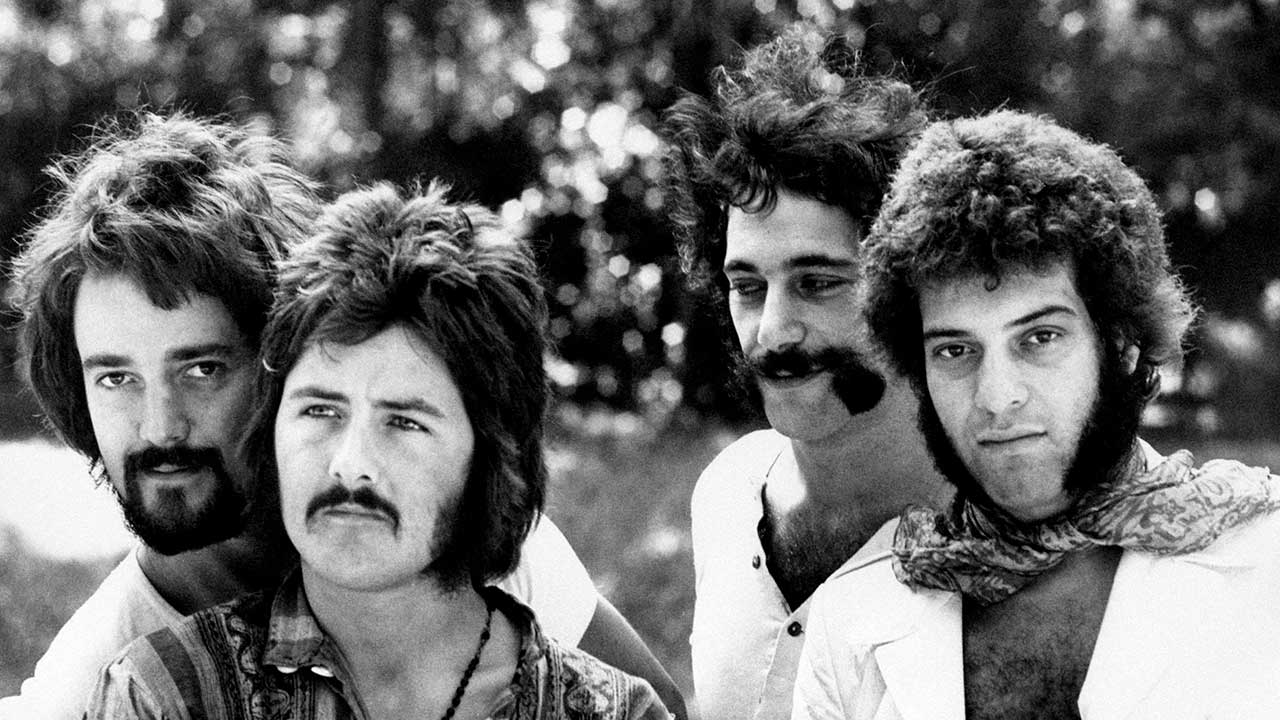The story behind the song: In The Summertime by Mungo Jerry
A song that Mungo Jerry didn’t consider to have potential as a single, In The Summertime was a worldwide hit that soundtracked the summer of 1970

The Hollywood Music Festival in May 1970 was packed with talent – a bill that included Traffic, Family, Colosseum, Free, Ginger Baker’s Air Force and Black Sabbath – but became known for two things in particular.
Held on Staffordshire farmland and attended by 35,000 people, it marked the UK live debut of the Grateful Dead. The other significant event was the appearance of a hitherto unknown band, Mungo Jerry, who would soon define the sound of that summer.
“We played late afternoon on the Saturday, just as the sun came out,” recalls banjo and jug player Paul King. “Ninety per cent of the audience were stoned, just lying around and smoking, all pretty lethargic. We went straight in with the harmonicas and the banjo, making a different noise to everybody else on the bill.
"The crowd all started getting up and clapping and dancing about. It was like someone had given them an electric shock. We went down an absolute storm. So much so that they asked us back the next day. That was really the start of it.”
Released on the eve of the festival, Mungo Jerry’s debut single In The Summertime raced to the top of the UK chart within a fortnight (ousting Christie’s Yellow River) and stayed there for seven weeks.
In the meantime, Mungo Jerry were No.1 in 15 other countries across the globe, as well as going top three in the US. Sales of In The Summertime eventually peaked at 30 million. Only Bing Crosby’s White Christmas and Elton John’s 90s tribute to Diana, Candle In The Wind, have sold more copies.
It’s not difficult to see its appeal. In The Summertime is the ultimate feel-good anthem, a celebration of carefree days and nights, guided by an unstoppable melody and the buoyant tones of the song’s creator, Ray Dorset. It was the perfect summer release.
Sign up below to get the latest from Classic Rock, plus exclusive special offers, direct to your inbox!
It was also strikingly distinctive. Mungo Jerry were more aligned to an old-time jug band than any of their contemporaries, blending elements of ragtime, skiffle and country with a set-up of banjo, guitars, piano and upright bass.
“We’d bring the house down wherever we played,” King asserts. “We were totally different. We didn’t have a drummer, so we were sat down, making our own percussion. Ray and I would be at the front, stamping our feet with great big boots on, Colin [Earl] was on honky-tonk piano, sometimes playing with his elbows, and Mike Cole’s double bass was an unusual sight. And I always took a flagon of cider on stage with me. When I’d finished drinking it I played the jug, so it was all very visual and hypnotic. It worked fantastically live.”
Mungo Jerry still went by their original name, the Good Earth, when Pye Records signed them to Dawn, their newly formed progressive label, in 1969. In-house producer/manager Barry Murray felt they needed something snappier.
“Ray suggested calling ourselves Ray Dorset & The Concordes, and Colin wanted White Lightning,” King remembers. “The management wanted the Incredible Sharks, which none of us liked. So I came up with Mungo Jerry from a poem in TS Eliot’s Old Possum’s Book Of Practical Cats, which mentions Mungojerrie and Griddlebone [Macavity: The Mystery Cat]. I had a load of other names as well – including Duran Duran, would you believe – but everybody decided to go with Mungo Jerry.”
Their breakthrough single was somewhat anomalous. Most of the band’s repertoire drew from rock’n’roll, blues and country. “None of our other songs were remotely akin to In The Summertime,” says King, who admits that the band didn’t see it as a potential hit. “Management wanted to put a single out, and I think we suggested Mighty Man, but Barry Murray disagreed: ‘I think we should go with In The Summertime, it’s quite catchy.’”
At under two minutes, the only problem was that it was too short. To mirror the song’s open-road theme, Dorset suggested adding the roar of a motorbike. When they couldn’t find one, studio engineer Howard Barrow provided the inspiration.
“Howard went outside and revved up his MG sports car,” explains King, “then we recorded it and replayed the beginning of the song after the noise. So In The Summertime is actually the same section spliced together, to make it last three and a half minutes.”
Radio North Sea International was the first station to pick up on the song, and the rest soon followed. Mungo Jerry’s crowd-pleasing appearance at the Hollywood Festival helped it along its way, and momentum took care of the rest.
“We couldn’t believe it when it took off so quickly,” King marvels. “Six months earlier we’d failed an audition for [TV talentshow] Opportunity Knocks, now we had a Number-One record that was outselling She Loves You by The Beatles. It hit us like an express train. We had no time to think. Our feet didn’t touch the ground after that.
With his huge afro, ready grin and heroic sideburns, Dorset quickly became the identifiable symbol of ‘Mungomania’. The band were regulars on Top Of The Pops, scooped the Best New Band award in Melody Maker’s end-of-year poll, and embarked on a punishing schedule of touring, TV and recording that didn’t let up for the next two years.
In The Summertime’s lyrics may have been permissible in 1970, but they’ve aged terribly. It’s exhortation to ‘Have a drink, have a drive/Go out and see what you can find’ was later used for a TV ad campaign warning against the obvious dangers of drinking and driving. Meanwhile, the song’s roguish pursuit of women – ‘If her daddy’s rich take her out for a meal/If her daddy’s poor just do what you feel’ – is equally dubious.
“They’re not the sort of lyrics I would’ve written, speaking for myself,” offers King. “It’s quite crude: ‘You can make it/Make it good in a lay-by.’ If you think about it, the lyrics are really below the belt.”
On a musical level, however, In The Summertime retains its sparkle even after half a century. “It’s the song that matters,” King concludes. “If you’re at home and it comes on the radio, it’s the beat and the energy that you hear. Mungo Jerry was a complete energy thing, especially at gigs, where we really went for it from start to finish.
"We were a good, honest country-blues band who got lucky with In The Summertime. And it just went haywire. It was crazy!”
Paul King’s new album A Baker’s Dozen is out now via Angel Air.
Freelance writer for Classic Rock since 2008, and sister title Prog since its inception in 2009. Regular contributor to Uncut magazine for over 20 years. Other clients include Word magazine, Record Collector, The Guardian, Sunday Times, The Telegraph and When Saturday Comes. Alongside Marc Riley, co-presenter of long-running A-Z Of David Bowie podcast. Also appears twice a week on Riley’s BBC6 radio show, rifling through old copies of the NME and Melody Maker in the Parallel Universe slot. Designed Aston Villa’s kit during a previous life as a sportswear designer. Geezer Butler told him he loved the all-black away strip.

